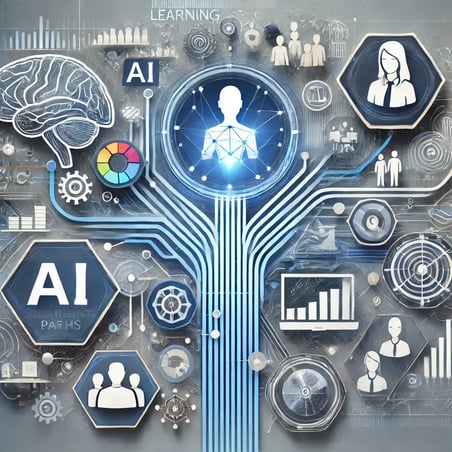The corporate learning landscape is undergoing a seismic shift. Artificial Intelligence is no longer a passing trend; it's a transformative force reshaping how we think about learning. For instructional designers and heads of learning, AI offers a powerful toolkit to create more effective, engaging, and scalable learning experiences. But how can you harness this potential to its fullest, without giving up on the power of human learning?
The AI Paradigm Shift
From personalized learning paths to real-time engagement analytics, AI enables us to deliver learning experiences that are not only tailored to individual needs but also more dynamic and interactive. The days of one-size-fits-all training programs are fading. Instead, we're entering an era where learning is adaptive, responsive, and deeply engaging.Moreover, AI-powered analytics offer valuable insights into how participants engage with content, with their instructors and with their peers. You can identify which topic most resonates, which areas require more attention, and how to tailor future sessions to meet the evolving needs of your workforce.
Scaling Learning Without Losing the Human Touch
One of the most significant challenges in corporate learning is scalability. How do you ensure that your learning initiatives can reach a global workforce with diverse needs without compromising on the human experience? With intentional AI, you can scale your learning programs without sacrificing quality or human-centered learning.Intelligent summaries of learning sessions segmented by topic, participant sentiment analysis, common misconceptions and real-time flags for learners at-risk, are a few of the valuable opportunities to deepen and enhance learning and teaching with intentional AI. These capabilities reduce the cost of delivery significantly, allow you to scale effective training programs and at the same time, focus on individual progress and overall outcomes.
Engage Learners Like Never Before
Engagement is the cornerstone of effective learning. It is not surprising that alongside “AI integration”, “Learner Engagement” was chosen by Heads of Learning as a top challenge in the LPI Survey of 2024. AI opens up new possibilities for engaging learners in ways that were previously unimaginable.Imagine generating thoughtful quiz questions on the fly, based on the content being discussed, or to instantly recap small group discussions with AI-generated summaries. A live class AI-assistant can answer questions, review content, and test participant’s knowledge in real time. This level of interactivity encourages continuous effective learning, and it is already possible.
Be a Leader, Not a Follower
AI should enhance and augment, not replace, the human elements of teaching and learning. AI can empower both instructors and learners, enabling them to do their best work and build genuine relationships. But these outcomes depend on how we drive this change.To the learning leaders reading this, the challenge is clear: how will you leverage AI to create learning experiences that are scalable and effective but also engaging and deeply human? Choosing your toolkit carefully is the first step, and this requires a proactive and thoughtful approach to your learning ecosystem.
A Glimpse into an AI-Powered Future
 Very soon, engaging and scalable learning experiences will be accessible and widespread. AI features that are seamlessly integrated into every aspect of learning, from content creation to real-time engagement analysis are already available in platforms built for learning. Learners benefit from personalized, responsive learning paths, while instructional designers and heads of learning have the tools they need to create truly transformative learning and training programs.
Very soon, engaging and scalable learning experiences will be accessible and widespread. AI features that are seamlessly integrated into every aspect of learning, from content creation to real-time engagement analysis are already available in platforms built for learning. Learners benefit from personalized, responsive learning paths, while instructional designers and heads of learning have the tools they need to create truly transformative learning and training programs.With award-winning AI leaders like Co-Founder Daphne Koller, Engageli brings unparalleled insight and expertise to the table. AI should be leveraged wisely to ensure solutions are innovative, relevant and grounded in research.
Artificial intelligence should serve and enhance human intelligence and education. As you blaze this new path, always remember the purpose: creating learning environments where participants feel supported, engaged, and inspired to grow. The AI toolkit can and should support the mission to deliver impactful learning experiences at scale.

